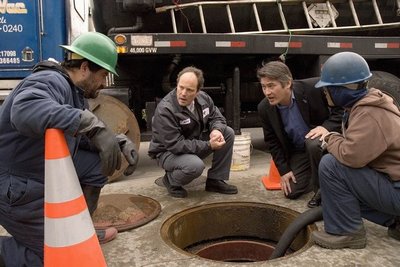November 16, 2006
First hybrids, now biodiesel — Motor Pool is going green
Such changes as switching to cleaner fuels and using more hybrid vehicles are part of a larger effort at making more environmentally sound, sustainable choices, says David Carr, manager of the UW Motor Pool.
And he hopes that the UW will be an example for its students, showing them how they can look for less-polluting ways of working as they move on to their own careers.
“We’re a college campus, and what we do, what we can demonstrate to the students and faculty is a different approach than business as usual,” Carr said. “We can do things cheaply, with the lowest cost possible, but here there is a sort of social responsibility to do things right.”
This summer, Carr said, the Motor Pool switched its trucks and buses to a mixture of ultra-low-sulfur diesel fuel and biodiesel called B5, which contains 5 percent biodiesel, a significantly cleaner fuel by far than regular diesel. “We did that first because we wanted to make sure there were no problems,” Carr said.
As part of that process, Carr said, Motor Pool had the one of its four underground fuel storage tanks that is dedicated to diesel completely cleaned Monday, “to protect the integrity of the fuel supply. If there are no problems with the use of B5, Carr said the Motor Pool may ultimately move to B20, with four times as much biodiesel. Such a level of biodiesel is said to reduce the vehicle’s overall power by 1 or 2 percent, but the changes will likely not be noticeable to the drivers.
The Motor Pool also has purchased two Ford Escape small SUV hybrids for use in Parking Services, replacing older cars. If those work well, Carr said, they’ll buy more.
Already, he said, there are 19 Prius hybrids among Motor Pool vehicles. “We hope to have an additional dozen more within the next year,” he said.
New vehicles and fuels are part of what Carr calls the Green Fleet Initiative (formerly called the Clean Fleet Initiative), an effort to reduce pollution and waste in all Motor Pool vehicles. But Carr said cultural change also is needed for a campus to continue going green.
Ever the evangelist for less waste and cleaner, greener transportation options, Carr said, “We’ve done all the low-hanging fruit. The easy stuff is done. Now we need collaboration and partners — champions and advocates to accomplish sustainability and lower emissions.
“If you spend 4 cents more a gallon for diesel — about $30 to $40 more per year for the average truck on campus — it’s not going to kill your budget. The whole ideas is to shift the culture to say it’s OK to use the better stuff, the cleaner stuff.
“And our influence on students will be multiplied.”

